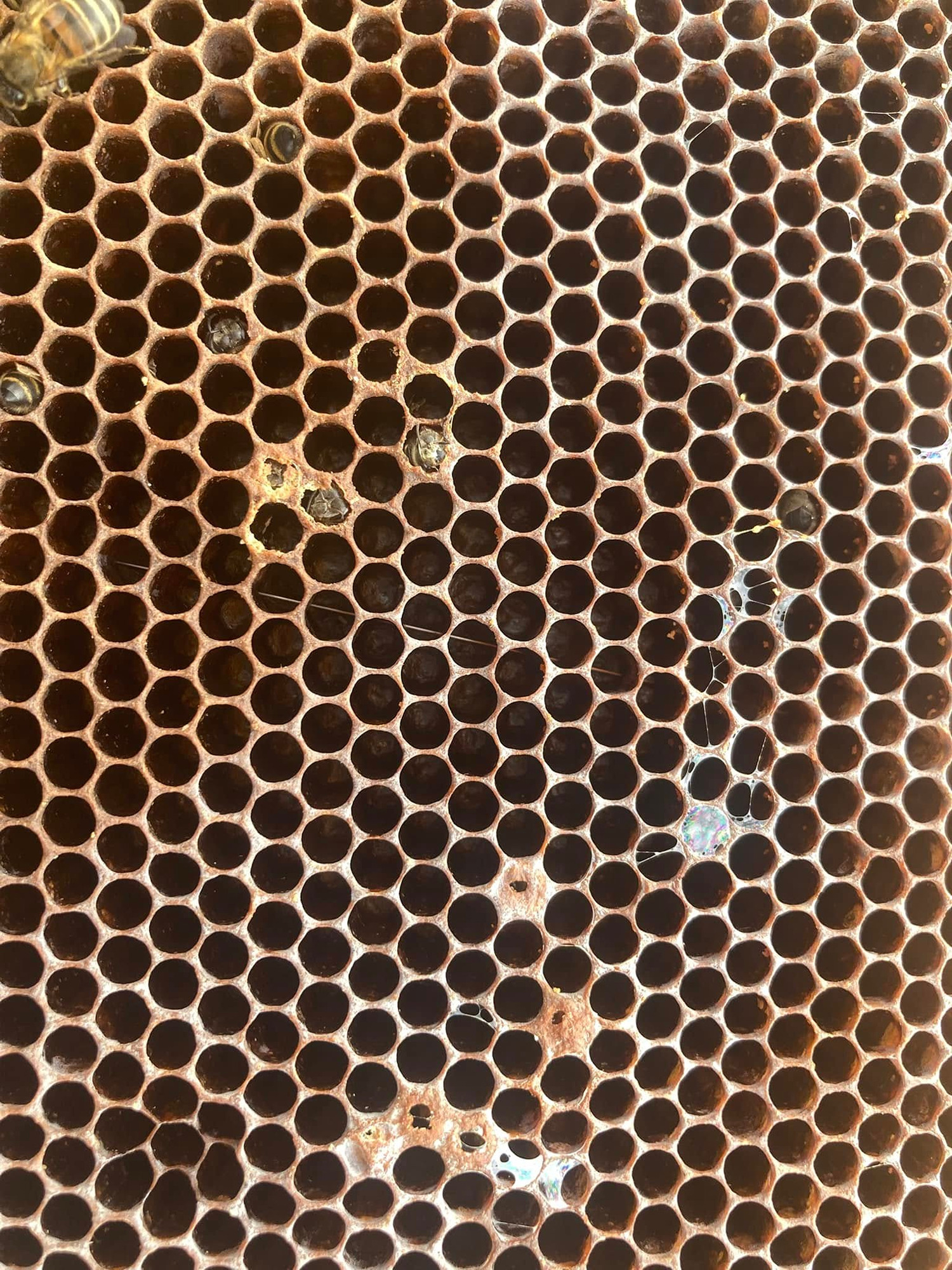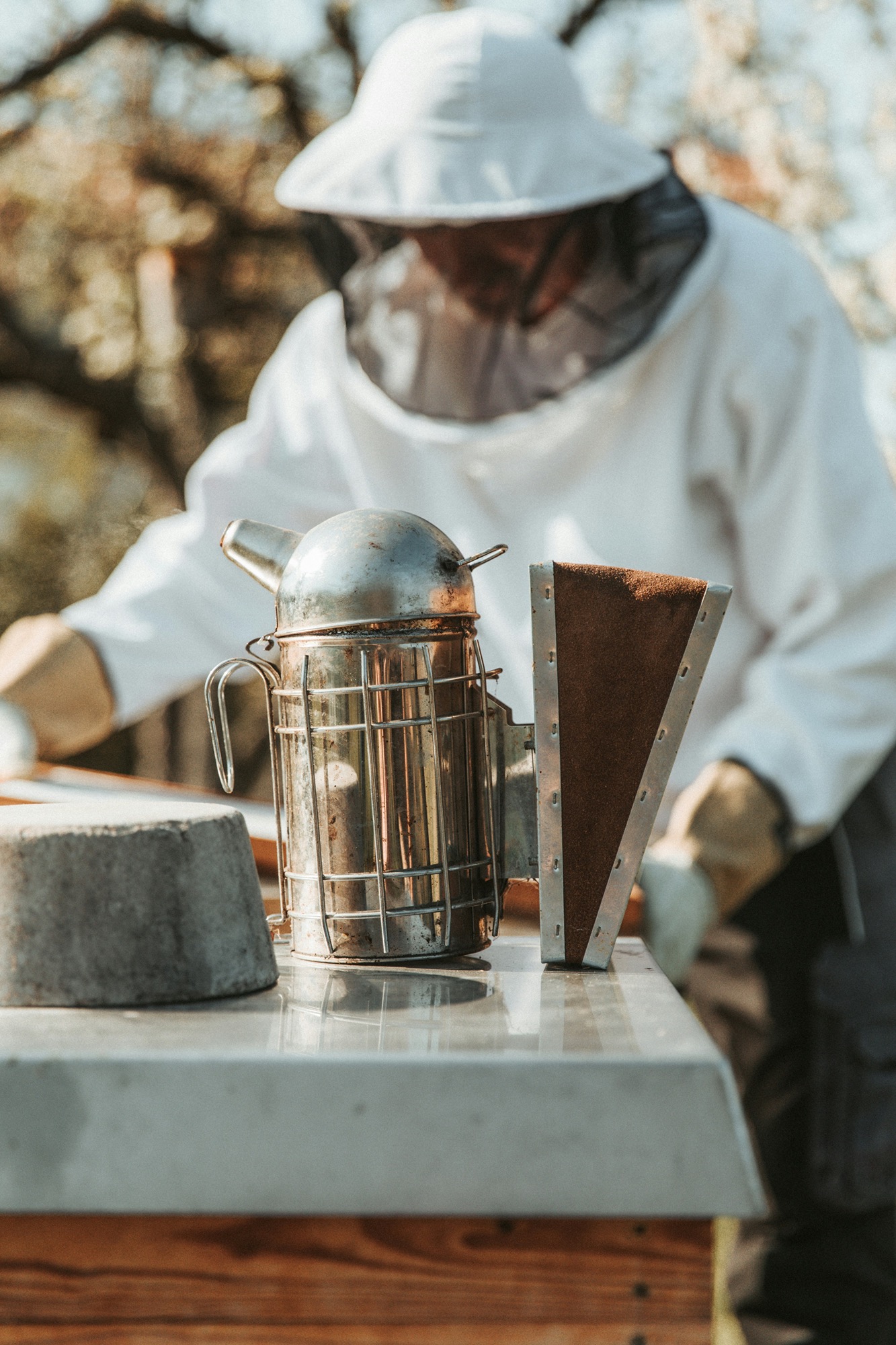March - Apiary Report

All but one colony have come through the winter. We can still loose bees in March due to the weather and starvation so beware.
The colony that we lost, housed one of our Buckfast breeder queens. We lost it in the last cold snap.
I think it was CCD (colony collapse disorder) It had several issues, although plenty of stores, the bees were trapped on a section of empty cells. Pictures below show starvation and signs of varroa. This was an extremely large colony when bedded down for winter. Only a cup full of bees left on hive when it died out. I couldn't find the marked queen with a green florescent sticky circle on thorax, nor any signs of young brood, only emerging bees with tongues out as in poisoning.


All our hives have pollen patties and they are happily munching on them.
Pollen is starting to be collected from crocuses and the hazel catkins. It wont be long before we can start venturing through the hives for the first inspection and taking off the mouse guards. Woodpeckers are still a problem. In the mean time, it would be wise to prepare all your equipment. Clean your queen excluders, build frames and hive parts. Get your suits prepared and washed. Along with preparing your smoker fuel.
Hopefully you all have started your hive records for this year, with feeding times. This is an important issue, the club does a very basic report on each hive on every inspection should it be required by the bee inspectors.
I will be venturing into the clubs hives once we have a warm sunny day for a very quick look not opening them for any length of time to prevent chilled brood. I need to put a super frame of drawn drone comb in our drone producing colony before the end of the month. This will give the drones ample time to mature.
We intend to number every hive for the records in the coming weeks.
I have worked out a programme of swarm control on 3 hives for each teaching group, beginners, basic and general husbandry.
Each group is going to do a demaree split. We have purchased 3 new national brood boxes for this exercise. The remaining hives are having normal splits.
At May's or June's club meeting, we are going to do a split which has just 1 capped brood frame with a queen. (Roger Patterson's Method) to monitor how it works.
We will also be putting on our regular queen rearing course when weather permits and dates will be arranged as soon as possible.
A major date for your diary is Friday 27th June.
The NBU Bee Inspectors are providing us an apiary safari health day. This will be the highlight of the year! You will remember it was arranged last year and sadly cancelled due to a Yellow Leg Hornet sighting in Kent. Several of you paid deposits to reserve your places which are honoured for this year. You know who you are!
7 Members of our club went to the BIBBA (Bee Improvement and Bee Breeders Association) talk by Roger Patterson at Lenham last Saturday. It was a good turn out! It was a long day for me however afternoon was more informative.
I personally didn't agree with everything that was said as it was based on breeding local bees and in some cases not doing varroa treatment. Roger liked referring to being bare handed and not wearing gloves. As we all know hygiene is becoming very apparent in all our apiaries. Bare hands isn't permitted for teaching or examinations.
Not treating for varroa was a subject put forward on local bees which had resistance. I personally don't think enough time has passed since it was first diagnosed some 30 years ago for the bees to adapt or even to have partial resistance not to treat. However, that's my opinion.
Yellow bees from mediterranean regions for early queens was discussed, I agreed with not importing from these areas as the queens and bees are not used to our climate and struggle to adapt.
I have no problem for the time being of importing queens from the same climate as ours, like Germany for example, our breeder queens.
Initially they spoke about bees migrating south to Africa and spilling into 4 main races. Ours being the European Black Bee. These bees living longer and have stronger vigia than imports, along with 3 main hybrids of which only Buckfast is still around.
The average amount of hives per beekeeper is 4.5 and in a survey before covid across Europe including the UK, about 600 colonies of dark bees out performed the same amount of non dark bee colonies.
We discussed queen rearing, the 4 main methods, cell punch, grafting, jenter/nicot and the miller. All of these we can use in our queen rearing session.
Along with making 5 frame Nucs Rapid build up!
Frame of honey, then a frame of brood and 3 drawn empty frames. They then shook 3 frames of bees from parent hive at the entrance of nuc, the young bees went in the nuc and the older ones back to parent hive.
Queen cell added which was about to hatch.
Mathematics behind this method. 1 frame of sealed brood = 3 frames of bees.
Once queen is mated, she will lay up 1 side of a national frame per day. (2 days a frame) Under 10 days she could completely fill all the frames with brood. Within a month the nuc could be put into a fully operational hive.
A sacrificial hive in the apiary is always a good idea for emergencies.
Tropilaelaps and small hive beetle were mentioned. Tropilaelaps is probably only 5/6 years away from reaching our shores. You cant see this mite with your naked eye as its so quick and small. If it arrived tomorrow, probably 95% of you would give up beekeeping. (Its worse than Varroa!) We currently have no method of dealing with it. Hopefully, within 5 years something will come to rescue!
All in all alot of topics were discussed and useful information was thrust upon us!
Andy Charley and Mark Potter manned the ABK Stall at the Saturday Food Market in Ashford Town Centre, coordinated by Katy Morrison. I understand they sold over 50 jars of club honey.
Excellent and well done!
I have 100 plus jarred up ready for sale, 8oz £6.50, 12oz £8.50 and 1lb jars £13.00
More volunteers are required for future markets please.
We have been given training support from BBKA for teaching of school children on visits in the way of a new Observation hive, children's bee suits and sundries. Joanne and Katy will be in charge of these events and more will be to be announced shortly.
Our Beginners/Introduction to Beekeeping Course is very well subscribed. We could only accept 2 more people.
The first date is Friday 28th March Tesco TN24 0YE, starting at 6.30pm -9.30pm
Futher dates are :
Friday 4th April Tesco TN24 0YE 6.30pm -9.30pm
Sunday 13th April Apiary TN26 2PE 1pm- 4pm
Sunday 27th April Apiary TN26 2PE 1pm-4pm
(not Saturdays as previously advertised)
£100 for the course payable to: KBKA Ashford Branch Sort: 09-92-99, Acc no. 67268830
Our new website and online shop will be live shortly... Very exciting, watch this space.
Looking forward to the Spring!

If you have any questions please get in touch, we're here to help
